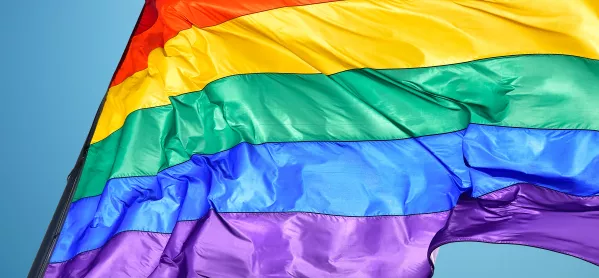Entering college can be a challenge for LGBT+ students, with some feeling that they have been "forced" back into the closet or leaving education altogether, a new report has said.
According to the Shut Out: the experiences of LGBT young people not in education, training or work report, published by charity Stonewall today, starting college can be a “tipping point” for some LGBT+ young people for becoming disengaged from education.
The report says several LGBT+ young people questioned went back into the closet when they started college, while others struggled to navigate their identity in a new environment without the support network they had built up at school.
Background: FE leaders challenge ‘silence’ on LGBT inclusion
Opinion: 'Being LGBT in college is getting better'
More: How to ensure your apprenticeships are LGBT+ friendly
Lack of structure
Others said they felt their college environment was not LGBT+ inclusive, “particularly where the lack of structure meant teachers were less aware of students’ behaviour, which led homophobic, biphobic and transphobic bullying and language to go unchecked”.
According to the report, some trans young people said the period of starting college was particularly difficult, with one participant describing being frequently “deadnamed” – being called the name he was given at birth – and having to repeatedly ask for peers and staff to use his correct pronouns, which made him feel unsupported at college.
A number of young people in the report, which considers the experience of 30 LGBT+ young people aged 16-24 as well as four non-LGBT+ young people, say that the lack of formal structure in college compared with school meant they felt less held to account for their learning and attendance. “As a result, many participants said they were often able to ‘fly under the radar’ with extremely low or no attendance. Rather than leaving suddenly, participants described how they slowly increased their levels of absence until they stopped attending entirely.”
According to the report, both LGBT+ and non-LGBT+ participants also became disengaged from college because of issues such as unmet expectations around what their course would be, or struggles they faced when trying to complete their qualifications. “None of the young people we spoke to said they had received useful guidance from their college on how to resolve these challenges.”
The report also says: “In work and apprenticeships, experienced and expected discrimination compound wider barriers to prevent many LGBT young people from starting, and staying, in employment.
“Most of the LGBT young people we heard from weren’t aware of how to access suitable apprenticeships. The small number of participants who had accessed apprenticeships faced LGBT-specific challenges during their time there, or struggled to find suitable work after completing them.”
Once they had left education, training or work, barriers stopping LGBT+ young people from re-entering included poor mental and physical health, a lack of practical support and knowledge about how to access opportunities, a feeling that limited opportunities were available, as well as lack of confidence.




